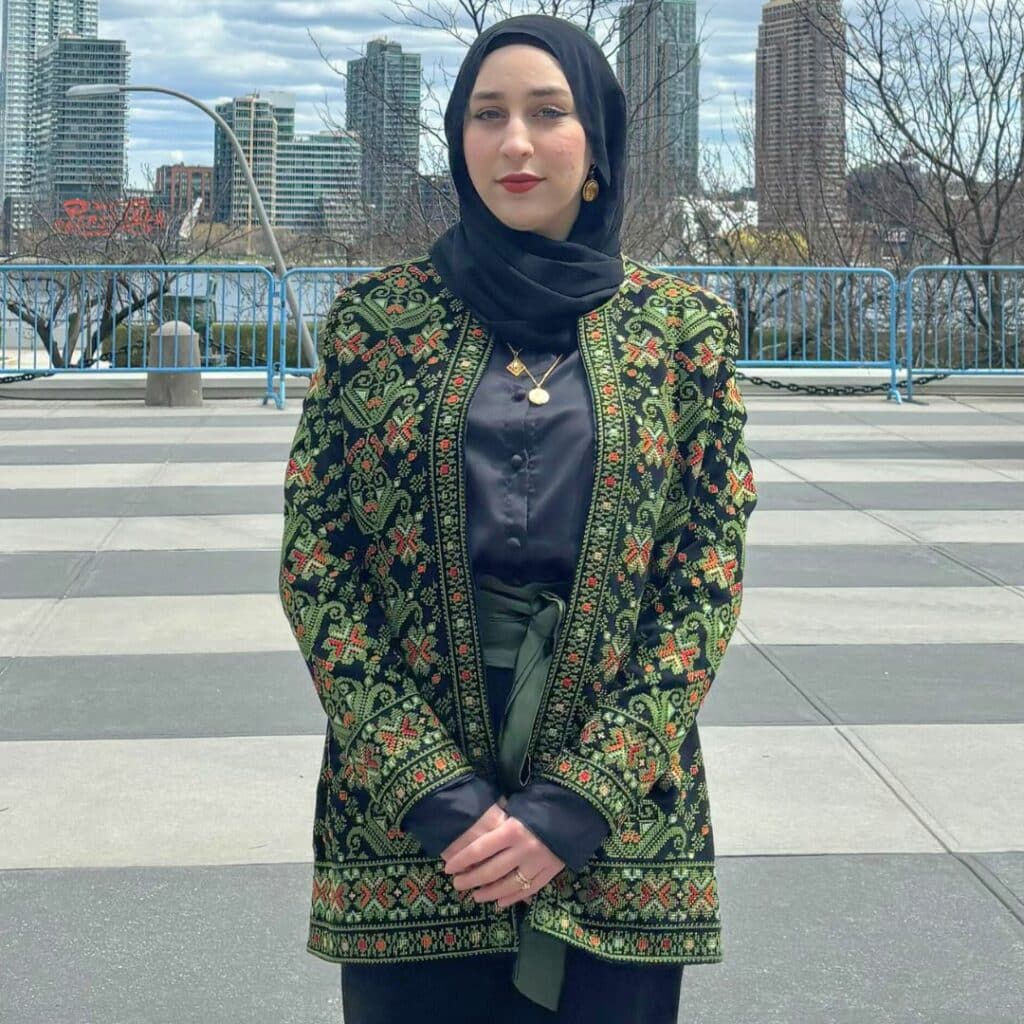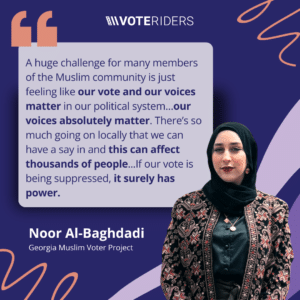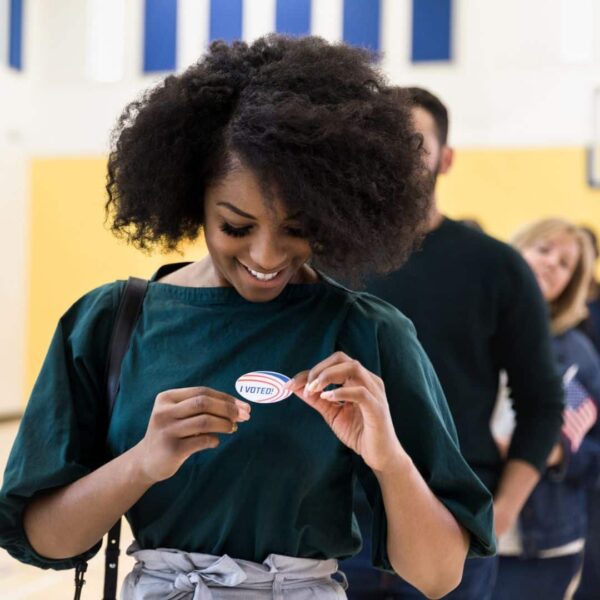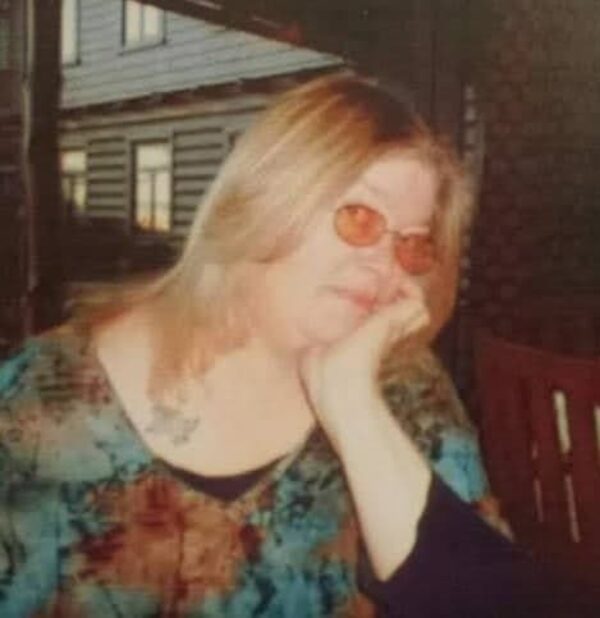
“Our Voices Matter,” Says Georgia Muslim Voter Project Organizer & VoteRiders Partner
VoteRiders’ Digital Communications Coordinator, Erin Carden, speaks with the Georgia Muslim Voter Project’s Lead Field Canvass Organizer, Noor Al-Baghdadi, about the importance of working together to equip Georgia’s Muslim community with the knowledge and tools they need to feel empowered and make their voices heard at the ballot box. — APRIL 30, 2024
Tell me about yourself and your role at the Georgia Muslim Voter Project (GAMVP)
I’m a Field Organizer for our voter registration program at the Georgia Muslim Voter Project (GAMVP). I mainly do quality control of physical voter registration cards and make sure canvassers are doing well in the field. I ensure that canvassers are aware of what they need to be looking out for to make sure our organization is doing good, honest work and ensuring that people’s information is safe and secure.
I’m also a recent graduate from Georgia State University where I majored in Political Science, which isn’t too far off from my job at GAMVP.
What is GAMVP’s mission and what are some of your key initiatives for 2024?
Our mission is to 100% focus on the Muslim community within Georgia — to make sure we are a civically engaged community, especially because civic engagement can look really scary for a lot of Muslims — especially those from certain ethnic backgrounds. It can be really disheartening to think about civic engagement, so GAMVP focuses on ensuring that we’re not just registering to vote — that’s a big part of our program, of course, but it’s not the only part of our program.
Civic engagement can look like so many different things — being active on campus, being active at the local mosque, being active at school. At GAMVP, we’re ensuring that Muslims all across Georgia — to the best of our ability anyway — have the opportunity to be engaged, to ask questions, and to have the information they need ready on hand. Knowledge is power, so we’re making sure people are equipped with the information they need to function as a Muslim in our political state.
How is the GAMVP celebrating Arab American Heritage Month this year?
Since the beginning of the genocide in Palestine, GAMVP has been really involved in ensuring that the Arab community is feeling safe, that they have resources, and that they have a community to fall back on.
Arab Heritage Month is also definitely something we’re continuing to uplift through powerful and impactful social media posts. For example, we posted about celebrating Arab writers like Edward Said, who wrote all about Orientalism and its implications on the Arab identity in the West. We referred people to books online and other resources to learn more. The power of sharing that knowledge cannot be overstated.
What is driving Georgia’s Muslim-American community to the polls this year?
GAMVP is a resource hub that provides voters with accurate information so they can make informed decisions at the polls. Everything going on overseas is a huge factor that many people are taking into consideration. If people are not voting for a candidate, many are at least casting a protest ballot — something many people didn’t know they had the option to do. In the time that I’ve worked at GAMVP, I have never seen so many people so willing to have these conversations, so passionate about registering to vote as soon they can, so passionate about casting a protest ballot or just having some sort of hand in politics because they feel so passionately about what’s going on overseas.
People also feel passionate about the Islamophobia that’s rapidly increasing. Domestically we’ve seen it with the firing of so many Muslims across the country, valedictorian speeches being cut for what Muslim students are trying to advocate for — that kind of thing. It’s things that American Muslims of my generation only grew up hearing about post 9/11 but didn’t experience much of ourselves until now. It’s really scary for some people. People fought so hard for that 9/11 fear to be gone and suddenly it’s back and people really want to be out there to do something about it.
What are some of the typical challenges Muslim Americans face when it comes to voting in Georgia?

For one, a huge challenge for many members of our community is just feeling like our vote and our voices matter in our political system. Sometimes it can feel really hard to feel that way. I come from a family that has been raised to believe our vote doesn’t really matter because if it mattered, we wouldn’t be in the position that we’re in today. If our vote mattered, our family at home would be in a better situation — that kind of thing.
But our voices absolutely matter. There’s so much going on locally that you can have a say in and this can affect thousands of people.
A lot of people don’t even know that you can vote for your sheriff’s department — that’s something I even learned working at the GAMVP. That’s so important for many marginalized communities to at least be aware of. So getting over that barrier — of not believing in the power of your vote and fearing the voting process — is a challenge.
For many Muslim communities that are Black, for example, there are already so many barriers when it comes to voting. For example, many marginalized communities are working paycheck to paycheck and don’t have the time to go out and vote. That challenge doesn’t just affect Muslim populations, but many other marginalized communities as well — which goes to show all the more that our vote does matter. If our vote is being suppressed, it surely has power.
Georgia requires ID to vote in person and by mail. Voter ID laws disproportionately impact new citizens and people of color, among other marginalized groups. How are GAMVP and VoteRiders working together to empower Muslim American voters and make voting more accessible for these communities?
Earlier this year, we had a training with VoteRiders on how to answer certain questions about ID and how to refer people in need of ID assistance to VoteRiders. Together we’re getting people the information they need to vote because the first step is being empowered with knowledge. Barriers exist, but there are ways to get around them and there are people out there who can help. We just need to make sure everyone knows that there’s someone out there for them.
I greatly appreciate VoteRiders’ partnership. I felt so empowered after training with them. It’s really beautiful to see that two different organizations can come together and make people’s lives so much easier by making sure they’re being given what they need — in every aspect. Identification is huge for voting, but so many other things too. I learned from VoteRiders about all the things you need to use your ID for — including housing, employment, and healthcare. I’m young still so I haven’t done half the things in life that an ID is needed for.
I admire VoteRiders’ work a lot and I admire the fact that you’re seeking Arabs to interview, so our voices can be heard. It feels really good to know that we have outlets for that representation.
Learn more about how you can partner with VoteRiders.



